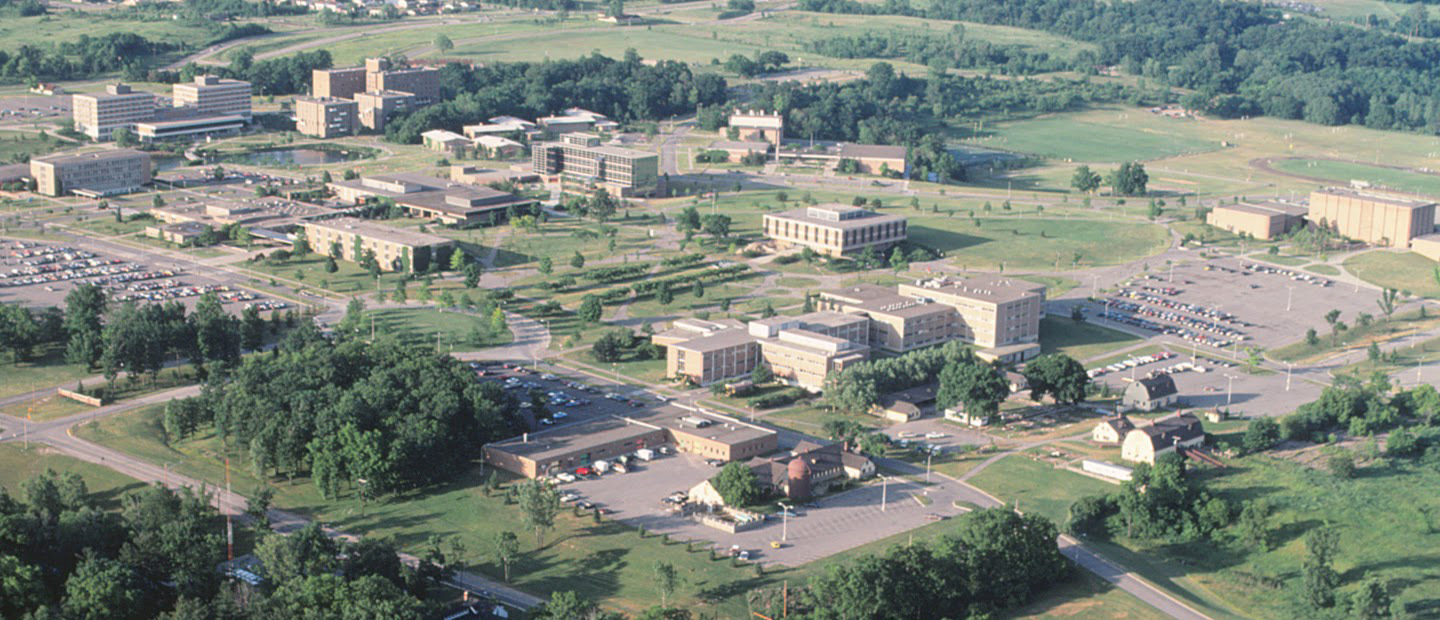
History Comes Alive Series
Special Thanks to Founding Sponsors John and Annette Carter
Join us for History Comes Alive, an informative and entertaining series offered by OU’s Department of History and endowed by John and Annette Carter. All History Comes Alive lectures will be held at 7 p.m. in the Oakland Center at Oakland University. We encourage you to RSVP to reserve a spot below.
RSVP: History Comes Alive Series - 9/17
RSVP: History Comes Alive Series - 10/22
RSVP: History Comes Alive Series - 11/13
RSVP: History Comes Alive Series - 1/7
RSVP: History Comes Alive Series - 2/11
RSVP: History Comes Alive Series - 3/12
Oakland University opened its doors to 570 students in 1959 with 2 buildings, North and South Foundation Halls, and 24 pioneering faculty members.
The campus weaved into the Meadow Brook Estate, home to OU’s founder Matilda Dodge Wilson. Wilson, widow of automotive pioneer John Dodge, had lived at Meadow Brook with her second husband, Alfred Wilson, since the late 1920s. Her gift of 1400 acres and $2 million in 1957 laid the foundation for Michigan State University Oakland, which later became the independent OU of today.
The very first courses were offered in Fall 1958 including, home economics, history, sociology, English and basic college subjects, held in a building of the Meadow poultry farm. Wilson even enrolled in the speed reading class. The first convocation took place on September 14, 1959 in the Oakland Center, which was the third building constructed on campus.
Today, nearly 20,000 students continue to find educational opportunities at OU, preparing them for a rapidly changing workplace and society. Rooted in OU’s foundational pioneer spirit, there are more than 2,000 world-class scholars and researchers that offer students and the community experiential, thought-provoking guidance.
More information about OU’s history is available through Kresge Library’s Early History.
History Comes Alive welcomes students, faculty and the surrounding community to take part in any of the free lectures offered, involving Detroit history, early American conspiracies, women’s experiences in the Holocaust, Nazi ghettos and book censorship.
Speaker: Karen Miller
Date: 7 p.m. Tuesday, September 17
Location: Banquet Room A, Oakland Center
During World War II, Detroit built the Herman Gardens Housing Project, designed to provide decent housing to more than 2,000 defense workers. The project promised to solve some of the most pressing problems in the metro area. The story of this housing project illustrates the complexities of living in the arsenal of democracy.
Speaker: Elaine Carey, Oakland University
Date: 7 p.m. Tuesday, October 22
Location: Banquet Room A, Oakland Center
From the late 1950s to the mid 1970s, the Herrera organized crime group (OCG) operated from Mexico’s Golden Triangle to Chicago, IL employing new technologies and flexible business practices that evaded law enforcement for decades. Early in the US War on Drugs, “Forbes Magazine” ranked the organization’s profits firmly in the top tiers of all US businesses. This talk explores the history of the Herrera OCG and why the Drug Enforcement Administration (DEA) recognizes the group as one of the most enduring architects of the modern drug trade.
Speaker: Allen Wells, Bowdoin College
Date: 7 p.m. Wednesday, November 13
Location: Banquet Room A, Oakland Center
On March 12, 1956, a Columbia University professor, Jesús de Galíndez, was abducted off the streets of Manhattan, forced into a private ambulance at gunpoint, drugged and rushed to a small airport on Long Island. From there, he was flown to the Dominican Republic. The disappearance is front page news in the New York papers, but investigations by the NYPD and the FBI drag on, and the case is never solved. No one is ever charged, but there is never a doubt who the architect of the crime is: the ruthless Dominican dictator General Rafael Trujillo.
The Galíndez Affair, as it came to be called, sheds light on the Cold War’s belated arrival in Latin America, and the often neglected role of reformers in Latin America, who for decades fought to eliminate authoritarianism in their homelands.
Speaker: Nicholas DiPucchio, Oakland University
Date: 7 p.m. Tuesday, January 7
Location: Banquet Room A, Oakland Center
During the administrations of Thomas Jefferson and James Madison, New England conservatives became convinced that French emperor Napoleon Bonaparte controlled the federal government. This lecture will explore how this conspiracy theory took hold in New England and nearly broke apart the early American republic.
Speaker: Katie Chaka Parks, Wayne State University and the Zekelman Holocaust Center
Date: 7 p.m. Tuesday, February 11
Location: Banquet Room A, Oakland Center
Women experienced every facet of the Holocaust. However, when history and stories illuminate the human experience during the Holocaust, whose stories are we referencing? When we think of the Holocaust, the names that come to mind are often male and, more specifically, male perpetrators. To tell the complete history of the Holocaust, half of the stories cannot be neglected. In this lecture, Katie Chaka Parks will discuss the many ways that gender impacted women’s experiences during one of the darkest times in human history.
Speaker: Yan Li, Oakland University
Date: 7 p.m. Wednesday, March 12
Location: Banquet Room A, Oakland Center
This talk examines a censorship practice known as “internal publishing,” focusing on the Chinese translations of foreign literature between 1960 and 1976. Classified for political and ideological purposes, these books were distributed exclusively through internal channels to a designated group of high-ranking officials and senior intellectuals. Despite strict control, they reached beyond the intended readership in the chaos of the Cultural Revolution and sparked unintended repercussions that challenged conventional narratives of censorship within the Chinese media.
The History Comes Alive series has intrigued and enchanted Oakland University’s students, faculty and surrounding community since 2003. Please explore some past topics for a look into the lively and thought-provoking discussion it inspires:
Department of History
371 Varner Dr.
Rochester, MI 48309-4482
(location map)
(248) 370-3510
fax: (248) 370-3528